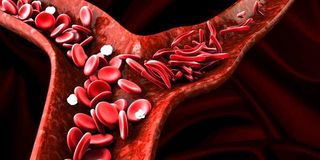Ministry advises couples to test for sickle cell before getting children

Sickle cell disease and other NCDs are projected to be the leading cause of death by 2030 if preventive measures are not put in place.
The Ministry of Health has urged couples to test for sickle cell disease before having children in an effort to curb the spread of the non-communicable disease (NCD), whose cases are on the rise.
Acting Director-General for Health Patrick Amoth said at least 14,000 children are born with the genetic disorder every year as a result of affected couples not knowing their status.
Statistics from the Ministry of Health show that NCDs account for 55 per cent of hospital deaths in Kenya, while over 50 per cent of hospital admissions are related to lifestyle diseases.
Speaking during a public awareness event in Vihiga County, Dr Amoth said the ministry believes that testing for sickle cell disease, which is prevalent in Western and Nyanza regions, will help tame the rising numbers.
The call comes at a time when the government and other partners have intensified the fight against the rise of NCDs.
Speaking during the commissioning of an NCD clinic in Hamisi in Vihiga County to serve Western, Nyanza and North Rift regions, Dr Amoth said the ministry is focused on providing specialised treatment and care to patients. Apart from sickle cell disease, other NCDs to be treated at the facility include rheumatic heart disease, type 1 and type 2 diabetes and hypertension.
The clinic was funded by the NCD Alliance (NCDA) in partnership with PEN-Plus and the Ministry of Health.
A similar facility will be set up in Isiolo County, with the agencies saying the facilities will target areas with rising statistics and high levels of poverty.
Dr Amoth said the Ministry of Health was putting a lot of emphasis on testing couples as a way of preventing sickle cell disease rather than the lifelong journey of seeking treatment.
“We need to do early detection through screening so that we can move to prevention,” Dr Amoth said, adding: “Before marriage, partners should be tested to ensure that neither is a carrier.”
Parents are passing the disease on to their children unknowingly because there is less focus on pre-marital testing, Dr Amoth said.
Leading causes of death
NCDA Executive Director Catherine Karekesi said sickle cell disease and other NCDs are projected to be the leading cause of death by 2030 if measures are not taken.
She said the clinics they are setting up in Level One hospitals will bring services closer to the community.
“Setting up these facilities in first-level hospitals means that people will be diagnosed early and their illnesses will be treated in time,” she said.
She added: “We are also trying to educate the public about self-management because NCDs seem to be lifelong conditions. Even if you are on medication, you need to be educated about self-management.”
She said the two clinics in Vihiga and Isiolo will also serve as centres of excellence for training health workers to strengthen the fight against NCDs.
Vihiga Governor Wilber Ottichilo urged residents to make use of the facility. Dr Ottichilo said NCDs were on the rise, noting that lifestyle diseases could be avoided through regular exercise.
“Many of our people now use motorbikes as a means of transport, even when they are not going far. It is important that we walk for short distances and only use motorbikes or vehicles for long distances," said Dr Ottichilo.
The PEN Plus clinics aim to reduce premature mortality from NCDs by one-third by 2030 through prevention and treatment. The clinics will also promote mental health and well-being over the same period.
The plan will be implemented through a four-pronged approach that includes establishing the PEN-plus clinical model at level four hospitals, opening centres of excellence for learning, national planning and coordination, and prioritising and funding NCDs by county. For the two projects in Vihiga and Isiolo counties, PEN-Plus will pilot them for two years and then hand them over to the respective devolved units for management.
Ms Karakesi said they intend to roll out similar projects in other counties across the country.





